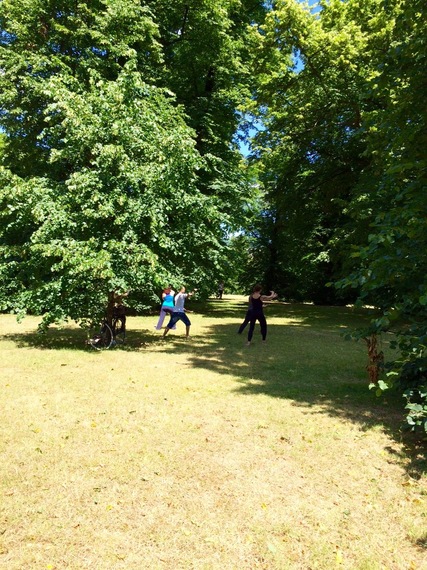A recent two-page spread in the International New York Times Review section exhumed an inkling of belief that humankind is on the right track. Op-eds with titles like, "No time to be nice at work?" by Christine Porath, "The power of apology" by Timothy Egan, and "Hearts broken open" by David Brooks, focused valuable copy space on feel-good news, seriously-researched and factually-backed. Ensuing pages reported on India's day of yoga by governmental decree, on collaborative responsibility for climate change, and on tackling doping in international race-walking (who knew?) in Saransk, Russia.
Just as Porath argues for attitudinal changes in the work place if we are to be healthy and productive, others note the need for national contrition to free subsequent generations of accusations of hypocrisy, that a life's purpose can be in the raising of a child or in the battling of an illness, and that a yoga rally can shift a Hindu-based activity for many, into secular wellness for millions more. The mental journey we travel in these articles is one that tallies with our credo; we are uplifted by affinity, and by a warm ray of hope for a better world.
Our global economy has managed to leave some of us somewhat solitary and often fractured. Our identity has never been so at odds with itself, when each validated characteristic can be in conflict with the existence of another. To be German, or Greek, or Spanish, can also mean being European, gay, Muslim and a yoga practitioner. This, theoretically, is great. Yet, practically, the nurtured and natured individual can feel like he/she is being asked to choose between their eye colour and height measurements, and who they should love while praying to a disapproving faith. How to build a collective identity that blurs disparities and sharpens a shared vision?
Education seems to be the answer to everything. And yet a college-based education in a democratic environment doesn't necessarily contribute to a greater connection of hearts and minds. We may be highly educated but we are apathetic, and a product of a hierarchy of life powered by exhaustion when faced with others' seemingly intractable and costly issues. We might regurgitate a collective groan of futility at Syria's war or Tunisia's slain, but when a divorcing couple is fighting for the non-custody of their child, we too have got it wrong.
Moreover, a bludgeoning of that vision seems to be the aim of others around the world. At a recent discussion at London's think-tank, Chatham House, UNESCO's Director-General, Irina Bukova, contended that "cultural cleansing," the destruction by terrorists of ancient sites and monuments of planetary importance, is a deliberate attempt to crush the potential for universal cohesion. By shattering thousands of years of human heritage, we sever the affiliation and shared experience of belonging to the same race.
A newspaper's heuristic drip-feed effects of feel-good reporting can school our innate potential for a shared vision, for "this desire for something that is surely true," in the words of 21-year-old intern Zachary Krowitz in a David Brooks' article. Feel-good coverage should not be the stuff of subscription-only lifestyle magazines; this is news, real news, and equal in importance to the coverage of terrorist atrocities, which resist an alternative, magnificent, no-less complex ideal.
Some of us carry a "bliss gene" (those with a propensity for happiness), but all of us could do with a gel of happy hormones that seeps into our mood, defines our personalities and nurtures an innate, shared consciousness of collective identity. Newspapers and their content should be helping us do that. La-de-da, you say? I don't think so.
